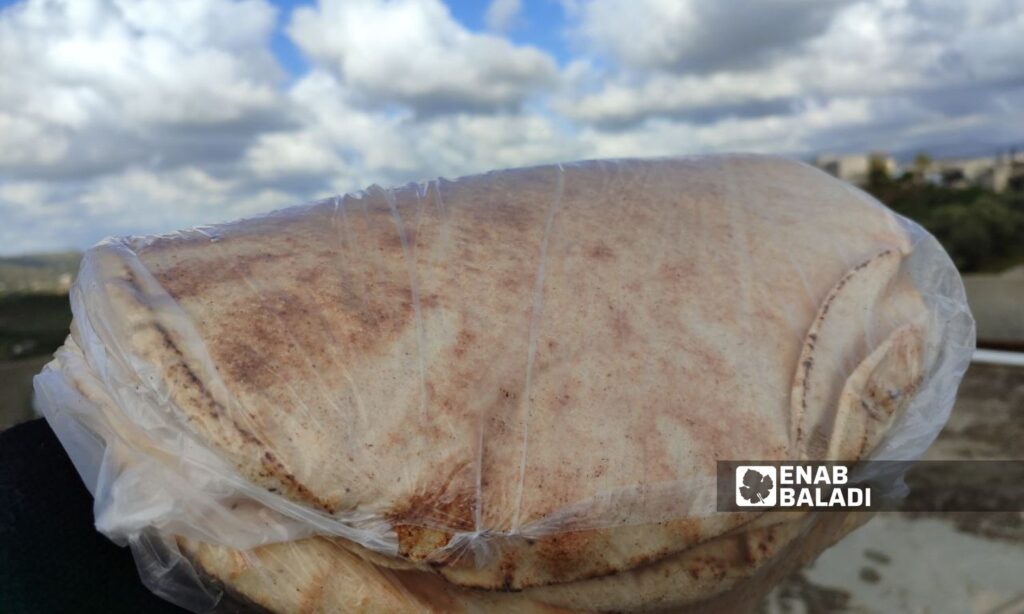Latakia – Linda Ali
Youssef (45 years old) leaves his house every morning and does not return until evening. He gathers firewood to sell, earning enough to feed his four children and his unemployed wife.
Youssef is not formally employed and is among day laborers who might find nothing to feed themselves if they cannot find work, said the man living in one of the villages near the al-Haffeh district in the Latakia countryside.
He added that he was barely managing with the price of bread at 200 Syrian pounds, and the recent slight price increase, which some might find “trivial,” poses a significant burden to him. It is proven by several instances when he had to borrow money to buy bread because he did not have even the smallest amount needed for it.
“There have been many nights where my wife and I went to sleep hungry so that we can save the loaves of bread for the children to eat in the morning,” said Youssef, who gathers firewood to sell and deprives his children of heating because he must choose between keeping them warm or feeding them.
On February 5, the regime’s Ministry of Internal Trade announced an increase in the price of subsidized bread from 200 to 400 Syrian pounds (weighing 1100 grams), coinciding with a 50% increase in state employee salaries.
Although the government claims it is lifting subsidies from certain individuals who do not need them to redirect aid to those in greater need, they have, to this moment, ignored the non-employed workers who rely on day-to-day jobs in various sectors like construction, repair shops, and other jobs that are often seasonal or require physical labor that many cannot perform.
“Nobody is thinking about us”
Shurouq, a forty-something-year-old woman living in the village of al-Muzairah in the Latakia countryside, said the decision to raise bread prices has negatively impacted her family, consisting of three children and her husband, an employee. Their daily bread allowance of 14 loaves, equal to two bundles, is not enough, so they buy two more bundles at the free market price of 3000 Syrian pounds each.
With a simple calculation, the family pays 163,000 Syrian pounds per month for bread alone, after the last two increases in the price of both subsidized and unsubsidized bread. The Ministry of Internal Trade raised the price of unsubsidized bread, available with the smart card system, from 1250 Syrian pounds to 3000 pounds on November 6, 2023.
Shurouq’s husband, a government employee, will not earn more than 370,000 Syrian pounds after the raise, which means about half his salary goes just for bread. She says, “What is there to say? We place our trust in God.”
A narrative is common on the Syrian streets that the price of bread will not stop at the recent increase, and it is expected that the price of a subsidized bread bundle may reach 1000 Syrian pounds, further burdening a broad segment of people across Syria.
Many residents of Latakia believe that the government does not dare to raise prices during the day and resorts to little before midnight to announce rises in its service fees, to quell public anger.
The decision to raise the price of bread coincided with a decree adding 50% to the fixed salaries and wages of civilian and military employees in ministries, administrations, and public institutions.
According to the decree, the minimum wage saw an increase of about double to become 278,910 Syrian pounds monthly, equivalent to about 19.3 dollars, according to the S-P Today website, which specializes in exchange rates.
What outraged Abu Hashem (63 years old), a retired employee, is the Ministry of Internal Trade and Consumer Protection’s justification for raising the price of bread. They stated that it “is not so much a rise as it is a citizen’s contribution to bear a small part of the cost burden to ensure the sustainability of the flow and availability of the item.”
Abu Hashem says that citizens are forced to contribute to funding their state, “which has been robbed by officials and the major corrupt,” and considers that citizens are paying for the corruption of the entire ruling organization.
Syria is among the six countries suffering from the highest rates of food insecurity in the world. There are 12.9 million people in Syria—more than half the population—who suffer from food insecurity. More than 90% of the population live below the poverty line, according to UN data.

